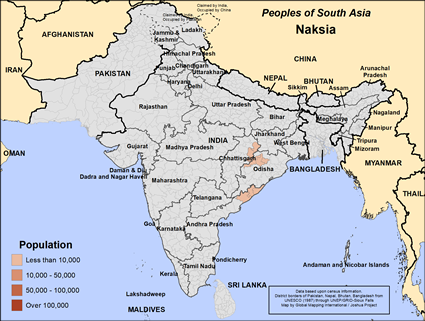Naksia in India

Send Joshua Project a photo
of this people group. |

Map Source:
People Group data: Omid. Map geography: UNESCO / GMI. Map Design: Joshua Project
|
| People Name: | Naksia |
| Country: | India |
| 10/40 Window: | Yes |
| Population: | 6,200 |
| World Population: | 6,200 |
| Primary Language: | Odia |
| Primary Religion: | Hinduism |
| Christian Adherents: | 0.00 % |
| Evangelicals: | 0.00 % |
| Scripture: | Complete Bible |
| Ministry Resources: | Yes |
| Jesus Film: | Yes |
| Audio Recordings: | Yes |
| People Cluster: | South Asia Hindu - other |
| Affinity Bloc: | South Asian Peoples |
| Progress Level: |
|
Introduction / History
The Hindu Naksia people live in the state of Odisha, India, where they have traditionally worked in agriculture and related activities. Over generations, they have relied on farming to sustain their communities, cultivating crops suited to the region's climate. Though modern economic opportunities have reached some areas, many Naksia families continue to engage in traditional agricultural practices, while others have taken up small-scale trade or labor in nearby towns.
What Are Their Lives Like?
The Naksia people primarily depend on farming for their livelihood. They cultivate crops such as rice, millet and vegetables, following seasonal patterns dictated by the monsoon. Some families also rear livestock, which provides additional food and income. In addition to farming, a few members of the community work in small businesses or as laborers in local industries to supplement their income.
Naksia families live in villages, where they share strong community ties. Their homes are generally constructed from mud, brick and thatch, using locally available materials. Life in the village revolves around farming, family and community activities. While some younger members seek education and employment opportunities in nearby towns, many return to assist their families during peak agricultural seasons.
What Are Their Beliefs?
The Naksia people follow Hinduism, worshiping deities such as Vishnu, Shiva and Durga. Religious festivals, including Diwali, Holi and Rath Yatra are central to their spiritual and social lives. These festivals provide opportunities for the community to come together for prayers, rituals and celebrations. The Naksia people also honor local gods and goddesses, particularly those associated with agriculture, to ensure bountiful harvests and protect their crops and livestock.
Temples and shrines serve as important centers for worship, where the community gathers for religious ceremonies. Their religious practices are deeply intertwined with the agricultural cycle, reflecting their dependence on the land for their livelihood.
What Are Their Needs?
The Naksia people face several challenges, particularly in terms of economic development, education and healthcare. Many still use traditional farming methods, making them vulnerable to environmental changes such as droughts or floods. Access to modern farming techniques, irrigation systems and sustainable agricultural practices would help increase productivity and economic stability.
Education remains a critical need, with limited access to quality schools in rural areas. Improving educational resources and infrastructure would provide greater opportunities for the younger generation to pursue alternative careers and improve their economic prospects. Additionally, healthcare services are often inadequate, with many families traveling long distances to access medical care. Developing better healthcare infrastructure and providing more accessible services would greatly benefit the Naksia community.
Prayer Points
Pray that the Spirit of wisdom of revelation would reveal who Jesus really is, rather than any wrong ideas from people who have misrepresented him in the past.
Pray that the Bible would be easily accessible in their language.
Pray that they would see the God of creation as the one who provides life, health and protection.
Pray for such a powerful transformation in their lives as they their find identity in the God who gives them life and offers life to the full.